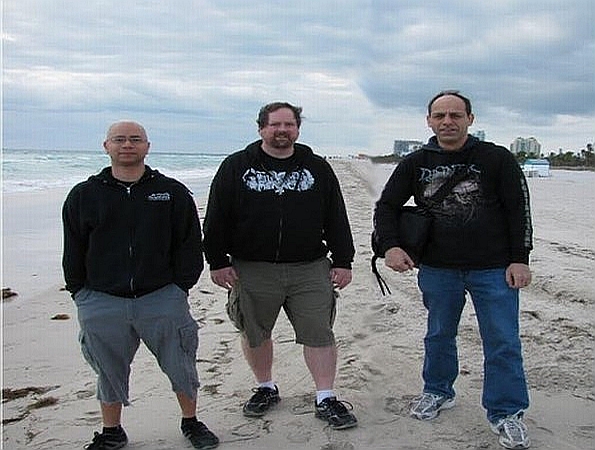Review by Natalie Zed; Photos by Adam Wills
Expectations can be tricky things. Often how much I enjoy a show is based on whether my expectations are met, surpassed, or drastically revised over the course of the evening. Sometimes being surprised is the very best thing; sometimes that same surprise can morph into radical disappointment. And sometimes expectations are just impossible. You are imagine and anticipate, but you really have no idea what is going to happen once you walk in the venue and the lights go down.
Swallow the Sun definitely met my expectations the most closely. They opened for Finntroll and Moonsorrow back in April, and occupied a nearly identical position of opening for a pair of bands with a highly developed aesthetic that dominates their sound and performance. The result was that, entirely unfairly, Swallow the Sun’s impact was diluted. I enjoy them when they’re on stage. They’re far from sedate; even the keyboardist valiantly headbangs, and the way they combine softer melodic passages with harsh vocals always does it for me. But invariably, they are overshadowed and somewhat absorbed by the bands that come after them. It’s an awkward position to be in, to be sure, but it’s a niche that they actually occupy quite well. The music is good, the stage presence solid. They are a perfect warm-up act. Their performance at this show in particular reminded me of stretches before a triathlon: not nearly as memorable or intense and the rest of the event, but necessary and valuable.



I missed Orphaned Land when they last came through Toronto back in March, and regretted it almost immediately. This time, I was thrilled to be present when they brought their particular, spicy brand of heavy metal to The Opera House. They draw upon both Israeli and Arabic influence and aesthetics in their music, which strikes me as an extremely bold political move. Vocalist Kobi Farhi also goes out of his way to look as much like Jesus Christ whipping around a mic stand as possible (though he insists on stage he isn’t actually Jesus, the look is clearly cultivated and maintained). He went so far as to hold the mic stand across his shoulders, reminiscent of a cross. Despite all the cultural heaviness that that Orphaned Land must negotiate, they do not get mired in seriousness. Their music, combined with their stage presence, is nearly impossibly not to dance to. Their music twines itself around my nerve centres and demands movement. It’s certainly heavy, and incorporates a lot of traditional folk elements that produces a rich, varied, exotic and high-energy sonic experience. I did the unsexiest headbang/belly-dance spaz dance on the face of the earth during their set, and could not care less who saw me.



My expectations for Katatonia were both high and somewhat nebulous. Katatonia and I have a history, you see. I’ve been looking forward to seeing them live since the day this concert was announced. I absolutely love The Great Cold Distance and enjoyed Night Is The New Day immensely as well. The tenderness in their vocals combined with unrelenting rhythms of their instrumentation are at once comforting and punishing, and have always had the ability to completely destroy me. Live, though, I found I did not experience the same kind of intense emotional catharsis and I do when listening to thier recorded music. Katatonia has always been a deeply personal band, and so I just could not get an intimate with the sound surrounded by hundreds of people in the Opera House as I can when I am alone in the bathtub sobbing into a bottle of wine. Have I mentioned lately what a catch I am?
This is not to say that Katatonia did not put on an exceptionally lovely live performance. Vocalist Jonas Renkse is at once physically imposing and intensely vulnerable. He cradles the mic in his hands almost pleadingly, offering his voice to the audience. I found him completely mesmerizing. It was also a great joy to watch Anders Nystrom perform in person. He’s a wiry-framed and incredibly intense musician, his sinews as tautly drawn as guitar strings, fully embodying his instrument. Their setlist was skewed heavily towards the last two albums, which suited my taste perfectly. I was particularly pleased to hear “My Twin” and “July,” both of which always slay me. They also worked in some older material, such as “Saw You Drown.”



It was particularly fascinating to watch the audience response to Katatonia. At first the room was still, almost hypnotically so. Then, gradually, the energy in the room began to pick up. The audience took all the pain and angst and tenderness that Katatonia gave them and fed off it, gradually morphing those gentler feelings of sadness into cathartic aggression. A very strange mosh pit developed late in the set, fuelled by a desperate energy, as though by throwing elbows and slamming bodies the crowd could stave off some of the torrent of emotional energy being mercilessly unleashed on them. It was either punch or cry, and I, like everyone else, chose to punch. This show was an incredible experience, a great release, but I honestly think I prefer consuming Katatonia in private. It is intimate, rather than collective, catharsis that draws me to their music.
More photos can be seen at the Katatonia / Orphaned Land / Swallow the Sun Photo Gallery.


